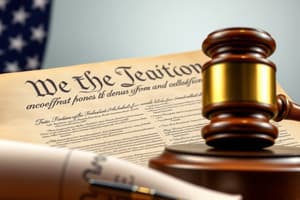Podcast
Questions and Answers
The ______ is the ultimate source of law in the US.
The ______ is the ultimate source of law in the US.
Constitution
The principle of ______ means that courts should follow precedent in similar cases.
The principle of ______ means that courts should follow precedent in similar cases.
Stare Decisis
In a civil case, the party bringing the lawsuit is called the ______.
In a civil case, the party bringing the lawsuit is called the ______.
Plaintiff
A ______ is a written order issued by a court prohibiting or requiring a specific action.
A ______ is a written order issued by a court prohibiting or requiring a specific action.
The case of Snyder v. Phelps is found in volume ______ of the United States Reporter.
The case of Snyder v. Phelps is found in volume ______ of the United States Reporter.
The ______ Amendment protects freedom of speech.
The ______ Amendment protects freedom of speech.
The ______ was a tax levied on newspapers in the American colonies.
The ______ was a tax levied on newspapers in the American colonies.
The case of John Peter Zenger involved the concept of ______, which means the jury can disregard evidence and deliver a not guilty verdict.
The case of John Peter Zenger involved the concept of ______, which means the jury can disregard evidence and deliver a not guilty verdict.
The ______ Branch of government is often referred to as the 'fourth estate' as it acts as a check on the other branches.
The ______ Branch of government is often referred to as the 'fourth estate' as it acts as a check on the other branches.
The ______ Court's opinion in Phelps v. Snyder had a significant impact on the law.
The ______ Court's opinion in Phelps v. Snyder had a significant impact on the law.
The concept of ______ refers to the government's ability to prevent publication before it occurs.
The concept of ______ refers to the government's ability to prevent publication before it occurs.
The case of Phelps v. Snyder involved a lawsuit for ______ distress.
The case of Phelps v. Snyder involved a lawsuit for ______ distress.
The ______ of ideas theory suggests free speech is crucial for a democratic society to function.
The ______ of ideas theory suggests free speech is crucial for a democratic society to function.
Strong rule of law leads to greater ______ in a society.
Strong rule of law leads to greater ______ in a society.
The ______ was a major historical precedent that influenced freedom of speech in the United States.
The ______ was a major historical precedent that influenced freedom of speech in the United States.
Flashcards
Sources of Law
Sources of Law
Various legally recognized origins where laws derive from, including constitutions, statutes, and common law.
Stare Decisis
Stare Decisis
The legal principle of determining points in litigation according to precedent.
Law of Equity
Law of Equity
A branch of law allowing courts to order remedies other than monetary damages, such as injunctions or specific performance.
Chevron Deference
Chevron Deference
Signup and view all the flashcards
Concurrence
Concurrence
Signup and view all the flashcards
Phelps v. Snyder
Phelps v. Snyder
Signup and view all the flashcards
Rule of Law
Rule of Law
Signup and view all the flashcards
Four Universal Principles
Four Universal Principles
Signup and view all the flashcards
Jury Nullification
Jury Nullification
Signup and view all the flashcards
Prior Restraint
Prior Restraint
Signup and view all the flashcards
First Amendment Exceptionalism
First Amendment Exceptionalism
Signup and view all the flashcards
Positive Rights
Positive Rights
Signup and view all the flashcards
Negative Rights
Negative Rights
Signup and view all the flashcards
Free Expression Theories
Free Expression Theories
Signup and view all the flashcards
Fourth Estate
Fourth Estate
Signup and view all the flashcards
Study Notes
Sources of Law in the US
- The US relies on multiple legal sources.
- Six key sources are:
- Constitutions: Establish government structure, ultimate source of law.
- Statutory Law (Statutes): Created by Congress/legislative bodies (e.g., penal code, civil code).
- Common Law: Based on court opinions (precedent) – stare decisis (let it stand).
- Law of Equity: Allows courts to order specific performance or injunctions when monetary remedies aren’t sufficient.
- Administrative Rules & Regulations: Executive branch creates laws through agencies/commissions (e.g., FTC, EPA) – Chevron Deference (previously used) is now overturned.
- Religious and Customary Law: Relevant on tribal lands.
Reading and Understanding Law
- Key elements:
- Case citations (e.g., Snyder v. Phelps, 562 U.S. 443 (2011)): identify volume, reporter, page, and year.
- Order of names: appellant and appellee.
- Case resources: Justia.com, Oyez.org.
Analyzing Court Opinions
- Key elements include:
- Opinion's author: essential for determining influence.
- Voting patterns: understanding how judges voted.
- Procedural history (posture of the case): how the case reached the current court.
- Case facts: details presented and argued.
- Legal opinion itself: rationale, argument, and legal principles.
- Disposition (outcome/decision): court's final ruling.
- Analyzing Snyder v. Phelps: The court's ruling included analysis of First Amendment protection for hate speech.
Rule of Law
- High Rule of Law: principles/laws are enforced.
- Four Universal Principles of Rule of Law:
- Accountability
- Just Law
- Open Government
- Accessible & Impartial Justice
Benefits of High Rule of Law
- Stronger economy (predictability for business).
- Increased peace and stability resulting in trust in government.
- Improved education and life expectancy.
- Reduction in poverty and civil strife.
- Better healthcare systems.
Scandinavian Countries and Rule of Law
- Homogenous populations facing immigration.
- High taxes to support extensive public services.
- Less use of armed law enforcement.
English Legal Roots
- English precedents like freedom of speech and publishing.
- Seditious libel: criminalizing speech criticizing government.
- John Peter Zenger trial in American colonies, where jury nullification occurred by not convicting the defendant.
- The Stamp Act and the taxation of newspapers.
First Amendment Exceptionalism
- Prior restraint (government stopping publication before it occurs) less used in the USA.
- Broader protection of speech in the U.S., including hate speech, unlike other regions.
Justifying Freedom of Expression
- Concepts of freedom of expression include:
- Positive rights (e.g., freedom of assembly).
- Negative rights (e.g., limiting government restrictions on expressions).
- Absolute rights (protecting all speech).
- Judicial interpretation rather than absolute protection.
- Hugo Black and William O. Douglas, justices who valued absolutism.
- Examples of positive and negative rights associated with protesting.
Free Expression Theories
- Important justifications for free expression:
- Questioning government (self-governance).
- Self-fulfillment, marketplace of ideas, safety valve.
- Checking value/watchdog role of the press.
- Fourth Estate (press) acting as a check on government power.
Studying That Suits You
Use AI to generate personalized quizzes and flashcards to suit your learning preferences.




